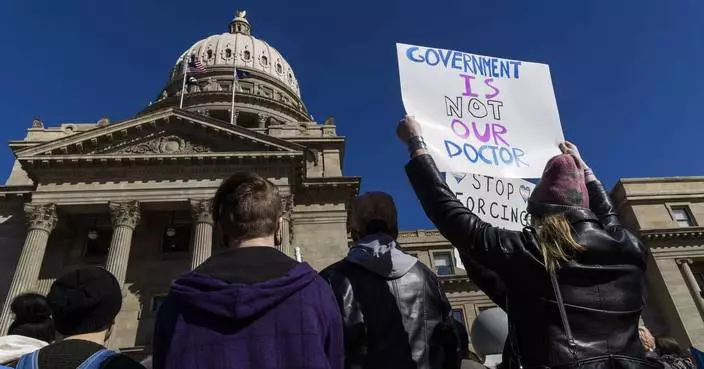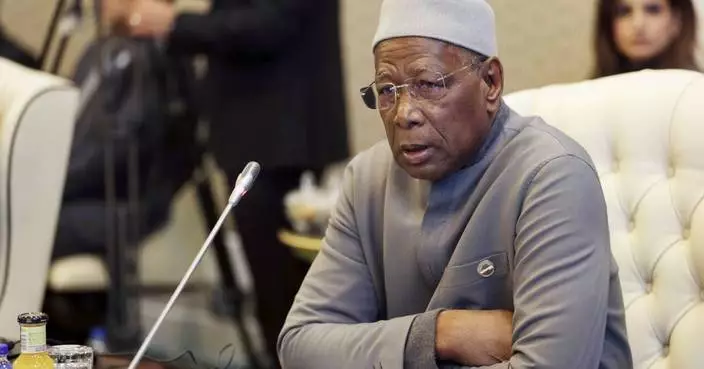The president of Libya's newly elected interim government arrived Thursday in the eastern city of Benghazi, the stronghold of the divided country's eastern factions, as part of a campaign to foster unity ahead of national elections in December.
Mohammad Younes Menfi, chairman of Libya’s Presidential Council, arrived from Athens, where he had been living for the past three years, and immediately met with dozens of tribal elders, academics and activists inside the VIP lounge at Benina airport, which serves Benghazi.
His visit follows a U.N.-sponsored conference last week in which delegates from Libya's warring sides picked four leaders to guide the nation ahead of the December elections. The election of the presidential council was a major — if uncertain — step toward unifying the North African country and ending one of the intractable conflicts left behind by the Arab Spring.
Since 2015, Libya has been divided between two governments, one in the east and another in the west, each backed by a vast array of militias. In April 2019, Khalifa Hifter, a military commander allied with the eastern government, launched an offensive to seize the capital, Tripoli. His campaign failed after 14 months of fighting and last October, the U.N. convinced both parties to sign a cease-fire agreement and embark on a political dialogue.
Menfi, a diplomat from the country’s east, was picked to head the Presidential Council, which includes two other officials. The forum also chose Abdul Hamid Mohammed Dbeibah, a powerful businessman from the western city of Misrata, as interim prime minister.
Each member of the three-man council represents a region of old Libya: Tripolitania in the west, Cyrenaica in the east, and Fezzan in the southwest. The appointment of an interim government capped months of U.N.-brokered talks that resulted in an agreement to hold elections on Dec. 24.
“Our objective is to achieve unity and true reconciliation and to collaborate with all in order to end the suffering,” Menfi tweeted shortly before his arrival. Shortly after leaving the airport, he met with Hifter at his forces' headquarters in the village of Rajma, 27 kilometers (17 miles) east of Benghazi.
During the meeting, Hifter reiterated his backing of the new transitional authorities and his support for a “peaceful and democratic alternation of power” in Libya, according to a statement released by his office.
Hifter had already welcomed the appointment of the new government, hailing its leaders as “national figures.” Although Menfi comes originally from the eastern city of Tobruk, some observers argued that he is politically allied to western factions, which may undermine the transitional authorities' ability to represent the political interests of the east.
Libya descended into chaos following the 2011 uprising that ousted and killed longtime dictator Moammar Gadhafi. The two rival governments have each been backed by an array of militias and foreign governments.
Menfi had served for almost a year as Libya's ambassador in Greece before Athens ordered his expulsion in December 2019, following a controversial maritime agreement between Tripoli and Ankara. He remained in Greece with his family but without diplomatic status.
BEIRUT (AP) — Leaked photographs of the son of Libya’s late dictator Moammar Gadhafi and the tiny underground cell where he has been held for years in Lebanon have raised concerns in the north African nation as Libyan authorities demand improvements.
The photos showed a room without natural light packed with Hannibal Gadhafi’s belongings, a bed and a tiny toilet. “I live in misery,” local Al-Jadeed TV quoted the detainee as saying in a Saturday evening broadcast, adding that he is a political prisoner in a case he has no information about.
Two Lebanese judicial officials confirmed to The Associated Press on Monday that the photographs aired by Al-Jadeed are of Gadhafi and the cell where he has been held for years at police headquarters in Beirut. Gadhafi appeared healthy, with a light beard and glasses.
A person who is usually in contact with Gadhafi, a Libyan citizen, said the photos were taken in recent days. All spoke on condition of anonymity because they were not authorized to speak to media outlets.
Gadhafi has been held in Lebanon since 2015 after he was kidnapped from neighboring Syria, where he had been living as a political refugee. He was abducted by Lebanese militants demanding information about the fate of prominent Lebanese Shiite cleric Moussa al-Sadr, who went missing during a trip to Libya in 1978.
The fate of al-Sadr has been a sore point in Lebanon. His family believes he may still be alive in a Libyan prison, though most Lebanese presume al-Sadr, who would be 95 now, is dead.
A Libyan delegation visited Beirut in January to reopen talks with Lebanese officials on the fate of al-Sadr and the release of Gadhafi. The talks were aimed at reactivating a dormant agreement between Lebanon and Libya, struck in 2014, for cooperation in the probe of al-Sadr. The delegation did not return to Beirut as planned.
The leaks by Al-Jadeed came after reports that Gadhafi was receiving special treatment at police headquarters and that he had cosmetic surgeries including hair transplants and teeth improvements. Al-Jadeed quoted him as saying: “Let them take my hair and teeth and give me my freedom.”
Gadhafi went on a hunger strike in June last year and was taken to a hospital after his health deteriorated.
Libya’s Justice Ministry in a statement Sunday said Gadhafi is being deprived of his rights guaranteed by law. It called on Lebanese authorities to improve his living conditions to one that “preserves his dignity," adding that Lebanese authorities should formally inform the ministry of the improvements. It also said Gadhafi deserves to be released.
After he was kidnapped in 2015, Lebanese authorities freed him but then detained him, accusing him of concealing information about al-Sadr’s disappearance.
Al-Sadr was the founder of the Amal group, a Shiite militia that fought in Lebanon’s 1975-90 civil war and later became a political party that is currently led by the country’s Parliament Speaker Nabih Berri.
Many of al-Sadr’s followers are convinced that Moammar Gadhafi ordered al-Sadr killed in a dispute over Libyan payments to Lebanese militias. Libya has maintained that the cleric, along with two traveling companions, left Tripoli in 1978 on a flight to Rome.
Human Rights Watch issued a statement in January calling for Gadhafi’s release. The rights group noted that Gadhafi was only 2 years old at the time of al-Sadr’s disappearance and held no senior position in Libya as an adult.

FILE - In this undated file photo made available Sept. 25, 2011, Hannibal Gadhafi, son of ousted Libyan leader Moammar Gadhafi, watches an elite military unit exercise in Zlitan, Libya. Leaked photographs of Hannibal Gadhafi and the tiny underground cell where he has been held for years in Lebanon have raised concerns. Libyan authorities are demanding that Lebanon improves living conditions for Gadhafi. (AP Photo/Abdel Magid al-Fergany, File)





